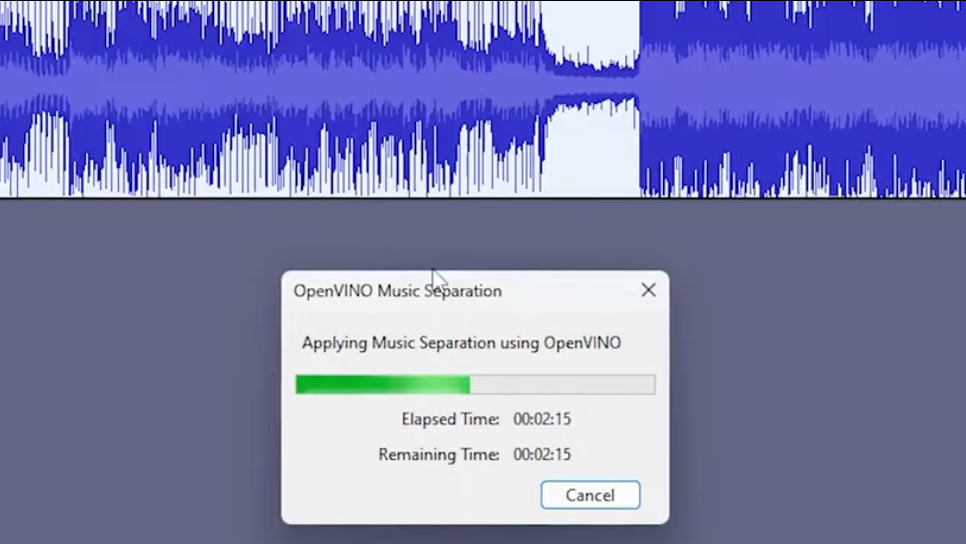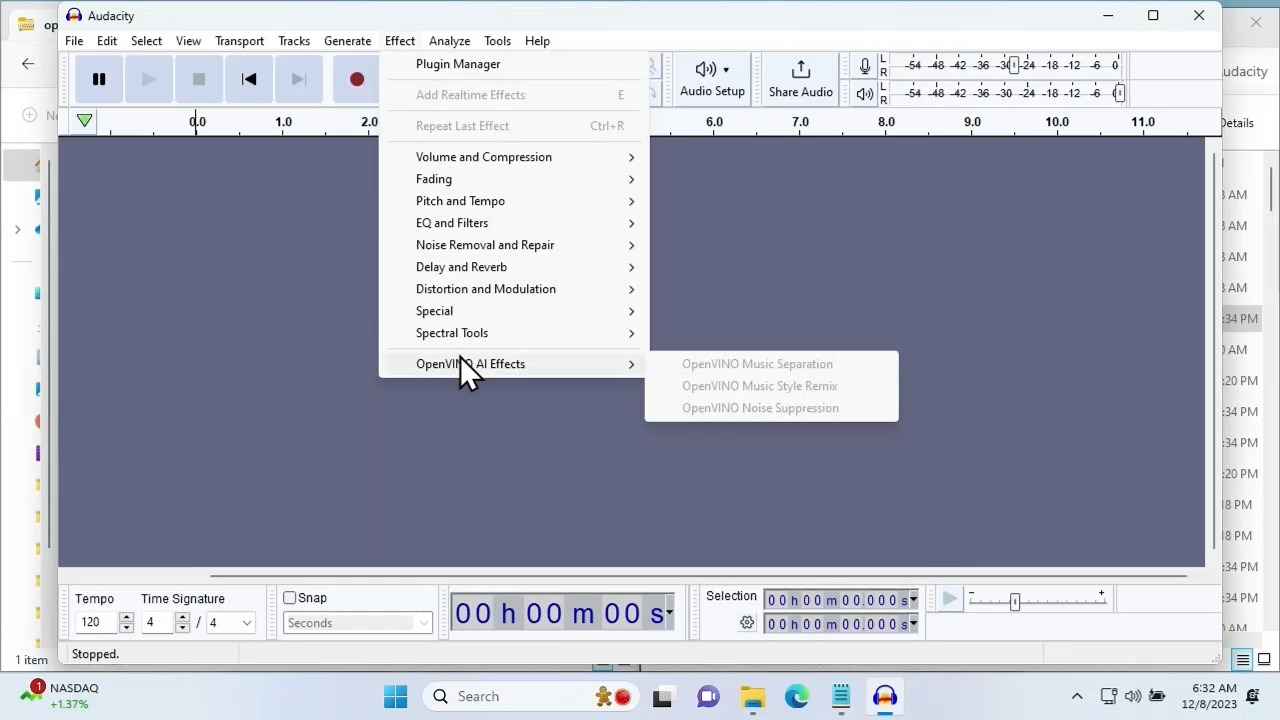Audacity gets AI transcription and noise suppression courtesy of Intel OpenVINO plug-ins
All the AI processing will take place locally on your PC.

AI effects have arrived for one of the most popular open-source audio editors available. In a recent blog post, it was announced that Audacity would be getting OpenVINO AI effects built by Intel (h/t NotebookCheck). The new AI plug-ins for Audacity are expected to appeal to both music makers and podcasters alike. In brief, OpenVINO tools are being made available for Audacity users who would appreciate AI-enhanced music generation, music style remixing, music separation, noise suppression, and voice-to-text transcription. All these AI features “run 100% locally on your PC,” asserts the Audacity team.
Generative AI has proven to be one of the most show-stopping aspects of this new era. With Audacity's new Music Generation and Music Style Remix features, users will be able to generate new music from a text prompt, or generate new compositions based on pre-existing audio soundscapes. It is explained that this plugin leverages Stable Diffusion - and Riffusion in particular.
Another audio skill that suits the abilities of AI is Music Separation. Using this new tool, Audacity users will be able to break apart the separate instruments in any music track. This could be a boon for those wishing to learn a particular instrument or for creating backing tracks.
The other new OpenVINO-based AI tools that have been released for Audacity will be welcome among podcasters – as the blog states. Audacity devs admit that the new Noise Suppression tool “behaves similar to Audacity’s built-in Noise Removal effect.” However, if you aren’t happy with the current noise suppression features available, this will surely be worth a try. It should be ‘smarter’…
Last but not least, Audacity has gained a Transcription tool powered by the well-known Whisper.cpp. This is useful for podcasters as it can “both transcribe and translate words and outputs to a label track,” says the Audacity team. It is also a boon to anyone wishing to take notes during a meeting, lecture, presentation, and so on.
Intel, the developer of the open-source OpenVINO, has made the new Audacity plug-ins available on GitHub. Potential users are warned that the release available at the time of writing (v3.4.2-R1) is only compatible with the Audacity 3.4.2 64-bit release for Windows. Step-by-step installation instructions are provided, and there is even a video available showing how to add them and check that they have been made available in the application’s ‘Effect’ menu.
The newly available OpenVINO AI plugins are for Windows only. However, the makers of Audacity seem to be happy for tinkerers to make them available for other Audacity platforms. “The project may be compiled on Linux and macOS, though no instructions are available for the latter yet,” says the Audacity blog.
Get Tom's Hardware's best news and in-depth reviews, straight to your inbox.

Mark Tyson is a news editor at Tom's Hardware. He enjoys covering the full breadth of PC tech; from business and semiconductor design to products approaching the edge of reason.
-
Albert.Thomas These sort of functions are what have me excited for "AI PCs". NPUs have a lot of potential!Reply -
ezst036 ReplyAdmin said:The newly available OpenVINO AI plugins are for Windows only.
This stinks given that Linux keeps growing it's user base. -
TerryLaze Reply
Yes, as soon as AMD supplies an alternative for openVINO.usertests said:Now make it work on AMD iGPU/XDNA
How is audacity supposed to make an API for intel work on AMD?! -
wingfinger What is audacity's status now? Ownership was transferred and there was some issues with what was included, privacy or its openness or something. I took a look at wikipedia but doesnt seem to jog the memory.Reply
Something like this?
https://www.engadget.com/audacity-privacy-policy-spyware-accusations-data-collection-210001803.html -
TechLurker I like the idea of being able to actually split music back up into individual instruments/vocals, but I'm hoping the Audacity spin-offs are able to incorporate it into their branches of Audacity.Reply -
LWinterberg Reply
They work on Linux, but for now you need to compile yourself. Intel is looking to get installers going for Windows and Linux soon.ezst036 said:This stinks given that Linux keeps growing it's user base.
Audacity now has automatic update checking and crash reporting, but doesn't store any personal data.wingfinger said:What is audacity's status now? Ownership was transferred and there was some issues with what was included, privacy or its openness or something. I took a look at wikipedia but doesnt seem to jog the memory.
Something like this?
https://www.engadget.com/audacity-privacy-policy-spyware-accusations-data-collection-210001803.html
Tenacity, the only fork which still has some development going, has announced on Mastodon: "We aren't going to fork this module to make a Tenacity-compatible version. We want to focus on other things that require much more attention, such as our libmad and libid3tag forks."TechLurker said:I like the idea of being able to actually split music back up into individual instruments/vocals, but I'm hoping the Audacity spin-offs are able to incorporate it into their branches of Audacity. -
TechLurker Reply
A bit of a shame then. But I expect it'll eventually show up in other ways at some point. Wouldn't be the first time some enterprising user with the coding skills chooses to make a fork compatible.LWinterberg said:Tenacity, the only fork which still has some development going, has announced on Mastodon: "We aren't going to fork this module to make a Tenacity-compatible version. We want to focus on other things that require much more attention, such as our libmad and libid3tag forks."

